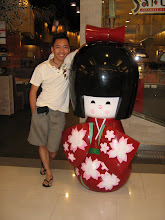 Our infatuation with drinking high-priced "natural" water from a bottle rather than from the tap is contributing to global warming and could even qualify as an immoral act. Buying bottled water used to be a sign of water shortages. Now we buy it come rain or shine, no joke intended.
Our infatuation with drinking high-priced "natural" water from a bottle rather than from the tap is contributing to global warming and could even qualify as an immoral act. Buying bottled water used to be a sign of water shortages. Now we buy it come rain or shine, no joke intended. Unfortunately, for something as simple as water there is a huge environmental waste associated with it and one many environmentalist are now asking for us to do away with it or at least cut down on its usage.
Water quality in Singapore are amongst the highest in the world and yet despite rising water bills we fork out an billion of dollars on buying water off the shelvaes every year. That equates to an average of 41 litres per person every year. Second only to carbonated soft drinks in popularity. Furthermore, consumption of bottled water is growing more quickly than that of soft drinks and has more than doubled in the past decade. Bottled water has now overtaken coffee and milk in sales nationally, and is catching up with beer. To some, it’s an affordable luxury. To others, a healthy alternative to sugary drinks. Regardless, many consider it a staple.
It was not always like this though. Only a decade or less ago, if your supply had been cut off or there was a drought then you used to have a bit of a search to find bottles of water in your local store. Now our supermarket shelves are jam packed with water from all kind of distributor.
Why is bottled water so Popular?
It cannot be the taste, since most people cannot tell the difference in a blind tasting. Much bottled water is, in any case, derived from municipal water supplies, though it is sometimes filtered, or has additional minerals added to it. Nor is there any health or nutritional benefit to drinking bottled water over tap water. In fact in a study conducted in the states bottled water was compared with tap water and was found that nearly a quarter of the samples of bottled water had significantly higher levels of bacteria. Another study carried out at the University of Geneva found that bottled water was no better from a nutritional point of view than ordinary tap water.
Wer can contribute the populatity of bottled water to the marketing strategy. Bottled water is undeniably more fashionable and portable than tap water. The practice of carrying a small bottle, pioneered by supermodels, has become commonplace. Of course, tap water is not so abundant in the developing world. And that is ultimately why I find the illogical enthusiasm for bottled water not simply peculiar, but distasteful. For those of us in the developed world, safe water is now so abundant that we can afford to shun the tap water under our noses, and drink bottled water instead: our choice of water has become a lifestyle option. For many people in the developing world, however, access to water remains a matter of life or death.
So why is bottled water so bad?
There is enough oil used in the production process of water bottles in Singapore to keep 10,000 cars on the road for a year. About 1.5 million tons of plastic are expended in the bottling of 89 billion litres of water each year. The total amount of energy used to produce and deliver one bottle of water is the equivalent of filling the same bottle a quarter full of oil. Bottled water for Singaporean consumers produces about 33,200 tons of CO2 emissions each year. Only 10% of water bottles are recycled - most go to landfill. In total we have discarded more than 3 billion empty containers. Having travelled the long distance to reach the shelves at the market place many of it end up being refigerated and chill thus contributing to the soaring electricity costs.
A quarter of bottled water bought travels up to 16,000km to reach our consumers. in addition to the energy cost of producing, bottling, packaging, storing and shipping bottled water, there is also the environmental cost of the millions of tons of oil-derived plastic, from non-renewable sources, needed to make the bottles.
Tap water versus bottled water
In an effort to help turn consumers away from bottled water there has been a growing amount of publicity about its negative impact. However, it is difficult to argue against people drinking water because of its health benefits.
A recent campaign attempted to get round this by trying to get people to carry on drinking water but just not the branded bottled variety. The DIY Bottled Water campaign focused on the difference, or lack of, between tap water and its branded and bottled alternatives. If you could not tell the difference then it was surely time to stop buying it.
In essence it was asking consumers, why are you paying all this money for another bottle of water when you could just refill your own from the tap? The bottled water industry is a triumph of marketing over common sense. It has become a symbol of our disposable culture at its dumbest. In countries such as Singapore, where high quality water is literally on tap, it's time to bin the bottle.
And that is where the arguments against bottled water become so strong for environmental campaigners. We are told that we have an abundant supply of safe drinking water which we are fortunate enough to have available to us all, yet we are consuming millions of bottles of very similar water.Are you willing to give up the bottle?














No comments:
Post a Comment